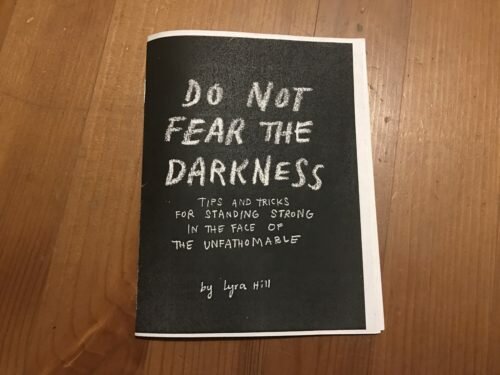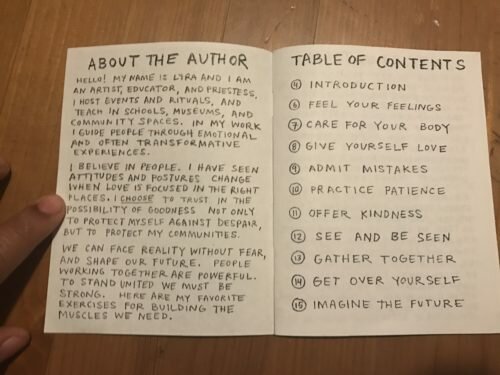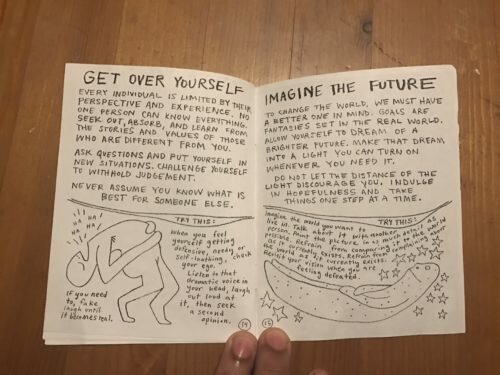Open Engagement has invited a group of contributors to make this year’s blog into a timely resource for organizing, moving forward and thinking creatively during particularly unjust times.
In light of our current reality and to align with this year’s conference theme of JUSTICE these blog posts will feature strategies, testimonies, literature, art and instructions as tools for working and living in the world as we know it.
The 2017 blog project, Resources on Justice, will grow over time, be published incrementally and will feature responses from a wide range of participants including activists, writers, thinkers, artists, teachers, arts professionals, community leaders, cultural workers, and more. It is an inclusive and accessible platform to think through the conference theme, introduce dialogues specific to the conference’s host city, as well as instigate ideas that can be applied beyond the context of this conference.
Amina Ross is an undisciplined artist engaged in the reevaluation of visual and written language. As of late Amina’s interests have led to an exploration of conceptions of Body and Beauty within communities dedicated to alternative modes of healing. Amina works across mediums, shaping spaces that honor darkness and love. These ambitions led to the founding of 3rd Language (2011-2015), queer arts collective. Currently these ambitions manifest themselves within Beauty Breaks, a participatory art project and workshop series. Amina is currently a teaching artist at Hyde Park Art Center and Co-Lead artist of Teen Creative Agency at the Museum of Contemporary Art, Chicago.
- Tips For Joining the Movement – by Radical Faggot
I interact with a lot of people everyday, ranging in age from 7 to 70 years old, from all corners of the city. In conversations big and small I often get asked the question “Well what can I do?”… those folks doing the asking referring to their quest for a course of action in a time that is so heavy. That question “Well, what can I do?” takes slightly different variations, is said with different tones of voice and different levels of resignation to what may feel like our fate, but at its core the same desperate seeking for the right course of action is the same. And in searching for an answer to this question I turn to this guide. Radical Faggot does the work of getting to the point, to all of the points without cutting any crucial corners.
2. Do Not Fear The Darkness: Tips and tricks for standing strong in the face of the unfathomable – by Lyra Hill



I love this little book. It is filled with small, practical solutions to the big things that loom large around and inside of us – like FEAR, TERROR and TREMENDOUS SADNESS. I think about the things that have pulled people of the past through times of immense horror, and in these moments of recalling the miraculous survival of so many I know that we humans possess a great power within our small selves. A great power capable of healing ourselves and others. I know that we are more powerful together, I also know that when I am grumpy, hungry, hurt and especially tired, I may forget how powerful I am, how powerful WE are – Do Not Fear The Darkness is a pocket-sized, portable and kind reminder.
3. Revolutionary Mothering: Love on the Front Lines – Edited by Alexis Pauline Gumbs, China Martens, and Mai’a Williams with a preface by Loretta J. Ross
In seeking to describe my deep, deep appreciation for this book, in seeking to articulate all of the vastness that is conveyed through it’s pages — I keep returning to the completely simple and age old saying “mother knows best”. In seeking answers to problems and systems that are simultaneously ridiculous and unabashedly violent, I take cues from the mothers within this book. Black mothers have been and will continue to be revolutionary, my own black mother included. Black mothers have always made ways where there seemed to be none, creating their own systems, languages and solutions to whatever reality they may have faced. In the midst of warfare against themselves and their families, mothers of color have continued to “birth new worlds.”
4. Finding Soul on the Path to Orisha – by Tobe Melora Correal
My mom gave me this book not too long ago, with a note that read something like, “I hope to have raised you with many of these ethics in place”. Except less formal in tone and much more beautiful than I’ve re-written it. And within this book I saw so much of me reflected, and heard so much of my mother’s voice reverberating in the space between the page and my memory. I’ve found this book to be an anchor, a textual reminder of the tradition I grew up within, so much I’ve heard made tangible through text on page.
5. Emergent Strategy Handbook – by Adrienne Maree Brown
A lot of my work happens at home. I co-run a space called F4F, holding events in the attic above my apartment. One of these events is Beauty Breaks, an on-going workshop and performance series based in re-thinking wellness and beauty. Having the work I do occupy the space I live in forces me to take a holistic approach to working with people and making things . I feel the impacts of what I bring into the world, and I live with those impacts, quite literally.
A holistic approach – within medicine – is characterized by the treatment of a whole person, a whole body. A holistic practitioner approaches the body as a complex organism made of various interconnected systems. A holistic practitioner does not see my ailing stomach and deep feelings of loss as completely unrelated circumstances. Band-aids are of no use to me right now. I am calling for holistic solutions, I believe Adrienne Maree Brown is as well. Brown’s writing has been incredibly formative for me, I first encountered Brown’s work through a zine at Allied Media Conference. Read about Adrienne Maree Brown’s emergence framework here: emergence (speech from opening for allied media conference 2013).
